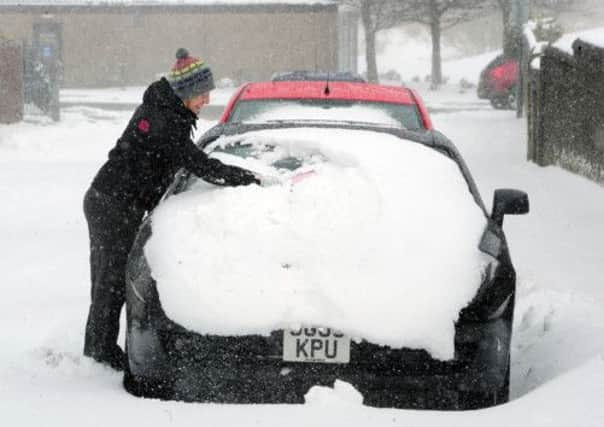Scots more scared of bad weather than terrorists


There are growing public concerns over power and water cuts, with Scots increasingly fearful of being stranded in cars or trains in blizzards. The new figures came yesterday as the Scottish Government launched its winter readiness campaign.
Emergencies caused by extreme weather are a concern for 49 per cent of Scots, up from 38 per cent last year, according to a poll by TNS BMRB for the Scottish Government and Red Cross.
Advertisement
Hide AdAdvertisement
Hide AdPower cuts, and disruption to fuel and water supplies remain areas of widespread concern at 46 per cent, up 4 percentage points from last year. Terrorism is a concern for 31 per cent. The fear of a major transport incident is now a concern for 27 per cent of Scots, up from 20 per cent.
But there is an increase in public preparedness for extreme weather – 44 per cent in 2013 versus 39 per cent in 2012. Transport minister Keith Brown said: “Severe weather can strike quickly and at any time of year. In March, we saw the impact of severe snowstorms on communities in Arran, Kintyre and Dumfries and Galloway.
“So whether it is making your home energy efficient, protecting your pipes, packing an emergency kit for the car or looking out for vulnerable neighbours, we can all play our part in helping Scotland get ready for winter.”
One in ten feels they are very or quite prepared for terrorism (11 per cent), just under the
13 per cent score for major transport incidents. Around three in ten people experienced disruption to their water, gas or electricity supplies in the past 12 months (28 per cent). The proportion reached two in five in rural areas (41 per cent).
In the past four years, parts of Scotland have been badly affected by severe weather – from high winds and blizzards last February, to the snow and freezing temperatures of previous winters. Transport minister Stewart Stevenson lost his job over his handling of the travel chaos caused by extreme winter weather in 2010, which saw thousands of vehicles abandoned on the motorway network and hundreds of people stuck in their cars overnight.
David Miller, operations director for the British Red Cross, advises preparing an emergency kit for the home and car, jotting down emergency phone numbers and checking on any neighbours, family or friends who may need help.
Inspector David Carballo, trunk road policing group, Police Scotland, said: “Effective planning plays a huge part in everyone getting safely to their destination and, in support of the Ready for Winter campaign, Police Scotland will be working with road safety groups and organisations to offer free advice.”
Advertisement
Hide AdAdvertisement
Hide AdLocal councils have also drawn up plans. Douglas Chapman, of the Convention of Scottish Local Authorities umbrella group, said: “The past few years have demonstrated how unpredictable our weather can be and the risks of being under-prepared for it.”